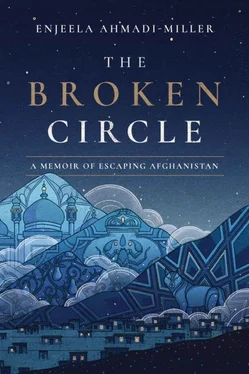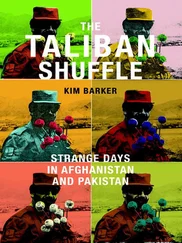It was after seven that evening when we all met in Padar and Zia’s room. Padar slouched in a chair by the window overlooking the city, which had turned to a sea of sparkling lights—red, white, green, and flashing neon of every shade.
I sat on the bed, eating from a plate of rice and chicken. We had just eaten a few hours before, but the tension must have made us all ravenous. Padar flipped through a small address book. He puffed on his pipe as he worked through his book.
“What’re you looking for?” I asked him.
“The number of an old friend. I’m pretty sure he lives here now, or somewhere around here.”
“Who?” Laila asked.
He rested the small book on his lap. “You may remember him. He came to some of the embassy parties I used to host at our home. Ram Ispahani.”
There had been so many diplomats and businessmen and politicians that visited our home over the years. I didn’t remember anyone by the name of Ram. With a name like that, he had to be Indian or Bangladeshi.
“Was he a diplomat from the Indian embassy?” I asked.
“No, he was a pilot.”
“Did he work with Saleem?” Laila asked. “I think I remember him, the tall, handsome man with a mustache? He used to fly Indira Gandhi to Kabul. He would come to our house while Gandhi attended meetings.”
“That describes a lot of men,” Zulaikha said.
We all laughed because it was true.
“Is he going to fly us somewhere?” Laila asked.
“Not likely. But he can drive us in his car,” Padar said as he rose and went to the phone on the small desk and dialed a number. He spoke to the man that answered in the most genial way, catching up. They talked like long-lost friends or brothers. We watched TV for a while, then he had us go next door and get ready for bed. I dragged myself through changing and washing up. None of us had slept much at the airport, and the day had wrung all the energy out of us.
Sleepy and ready to climb into bed, I heard a knock on the adjoining door between the rooms. “Girls,” Padar called. “Come in here a minute. I want you to meet someone.”
Dressed in our nightgowns, we slipped into robes, and Laila opened the door. In the next room we met Ram Ispahani. He was a strikingly handsome Indian man, dark-skinned and tall, with a bushy, gray-flecked mustache. His salt-and-pepper hair was trimmed short, and he wore jeans and a sport shirt. He had the brightest dark eyes—they were intelligent, alert with a glint of humor. He sat on the edge of one of the beds.
“Salaam,” he said to us. We each greeted him, and he gave us the warmest smile. He then turned to Padar, who slumped in the chair by the window. “Of course I will help,” he said. “We will leave in the morning, early. I know just the place we can cross. I’ll have you on the train to New Delhi by lunchtime.”
A short while later, back in our room, we snuggled under clean, warm blankets and crisp sheets. Through the closed door, we could hear them laughing and talking loudly. The men were deep into their plans or having a great time reminiscing, or both.
“I can’t believe it. As soon as one plan falls apart, Padar just comes up with another one,” I said.
“This one better work,” Zulaikha said. “I hated getting nearly beat up by those airport guys. They were horrible.”
“Freaks,” Laila said.
“Gorillas,” I said. We all started laughing.
As we quieted down, I murmured, “Tomorrow will be different.” But I was speaking to myself. Both of my sisters were asleep. I closed my eyes. We were going to India. I whispered under my breath: “Inshallah.”
Passing through the center of Dhaka even at an early hour was no easy task. Just after dawn, the sidewalks were filled with women in saris and men in jeans trudging off to work. The streets were jammed with rickshaws: two-wheeled carts pulled by boys on bicycles. All of them were decorated as stunning works of art, in bright luminescent reds, fluorescent greens, yellows, and blues. We turned down a street and were met with a horde of rickshaws. We moved slowly through the traffic, past glass-walled buildings, cement towers, apartment houses. The city went on forever.
We left the city to the west along route N5, a well-paved two-lane highway that passed through several smaller cities, each with elaborate temples and mosques, industrial buildings, office buildings, and power plants, before reaching the countryside where we would cross the two-mile-wide Padma River.
Ram planned on taking us to Kolkata, which was in West Bengal state, India. It was a long day’s drive from Dhaka, and we should be there shortly after dinnertime. He thought we would easily blend in with the native Indians because of our dark skin. We’d be able to purchase train tickets for the ride to New Delhi. Ram talked so confidently; it seemed so simple.
As the day unfolded into a blazing morning, it became clear that Bangladesh was very different from Afghanistan. Everywhere, we passed green fields, stands of palm trees, and thick forests. We crossed small rivers and creeks, and ponds were everywhere. The fields of crops—corn, wheat, hay, alfalfa, rice—were in full bloom. Padar recognized all of them and pointed them out as we sped by. Cows roamed the fields, and Ram explained that in parts of Bangladesh, and more so in India, cows were sacred and were not to be eaten.
It must have been before noon that we turned off the main highway onto rough back roads. Some were no more than wheel tracks as we traveled deeper into the countryside. I was beginning to feel sick to my stomach. Ram stopped the car, and Padar had me sit up front with him. He held my head as I tried to hold back the nausea.
The two men chatted and bantered as we drove. Ram was full of stories about people I didn’t know, dignitaries he had flown all over Asia and Europe.
We now passed farm houses and villages that were more primitive, simple mud huts with shaggy thatched roofs. When I couldn’t hold back my nausea any longer, Ram pulled over and I threw up on the side of the road. Padar held on to me as I leaned over a grassy ditch.
When we were back to driving, Ram soon came to a crossroads. He turned left and far down, I could see a building in the middle of the road.
“There’s the border crossing,” Ram said. “It’s very isolated. Once we’re across here, we will join back up with the road to Kolkata.”
He rolled the car slowly up to the gate and stopped a couple of yards from it. He turned off the ignition. Our car sat in the middle of the dusty road. In the silence, we stared out the window at the guard post. A border soldier in rumpled camouflage fatigues with a rifle slung over his shoulder sauntered into the sunshine to inspect our car.
“You kids stay here,” Padar said. “We’ll be right back.”
“This won’t take long,” Ram said.
They both got out, closed the doors, and walked slowly up to the guard, who had now been joined by another one. Both of them had rifles. We rolled down the windows to listen. At first they simply talked, Ram gesturing with his hands, the guards shaking their heads. A third uniformed man came out of the building and stood with the men.
They asked Ram and Padar many questions and gestured toward the car. We watched through the window as the questioning became more intense, with one of the soldiers stepping close to Ram, who must have felt threatened, because he moved back. Padar spoke very little and only in reply to the guards’ questions. Finally, Ram shouted something back at one of the men in uniform. The soldier struck Ram on the side of the head with his fist. Ram staggered back and fell to the ground.
Читать дальше













